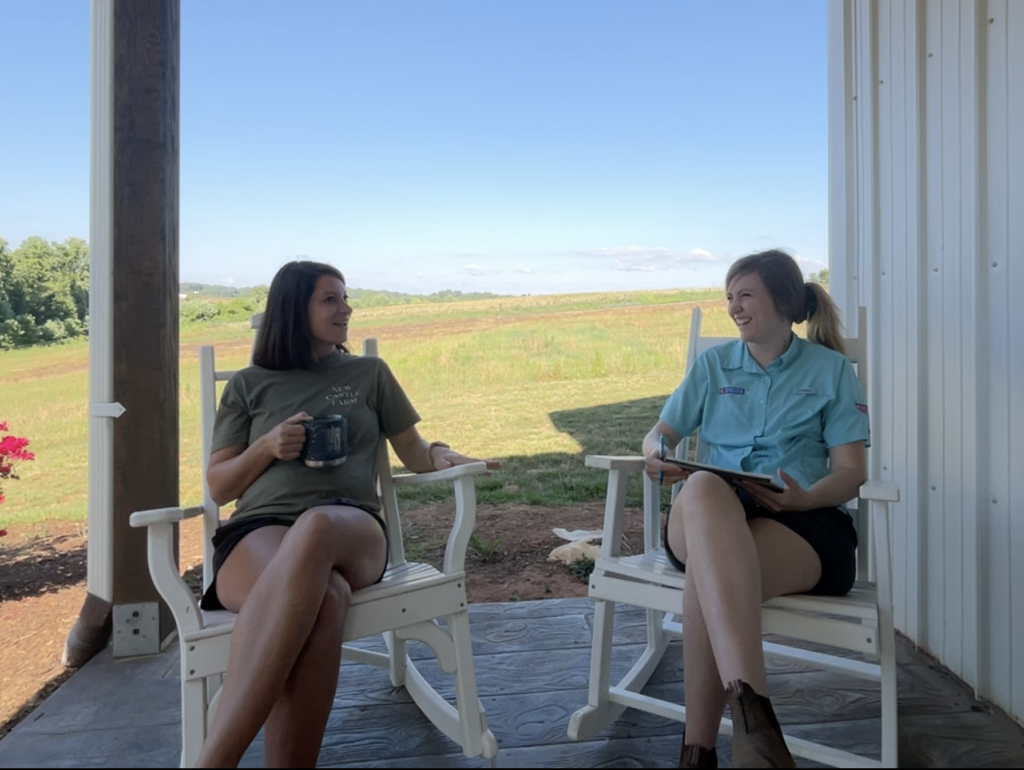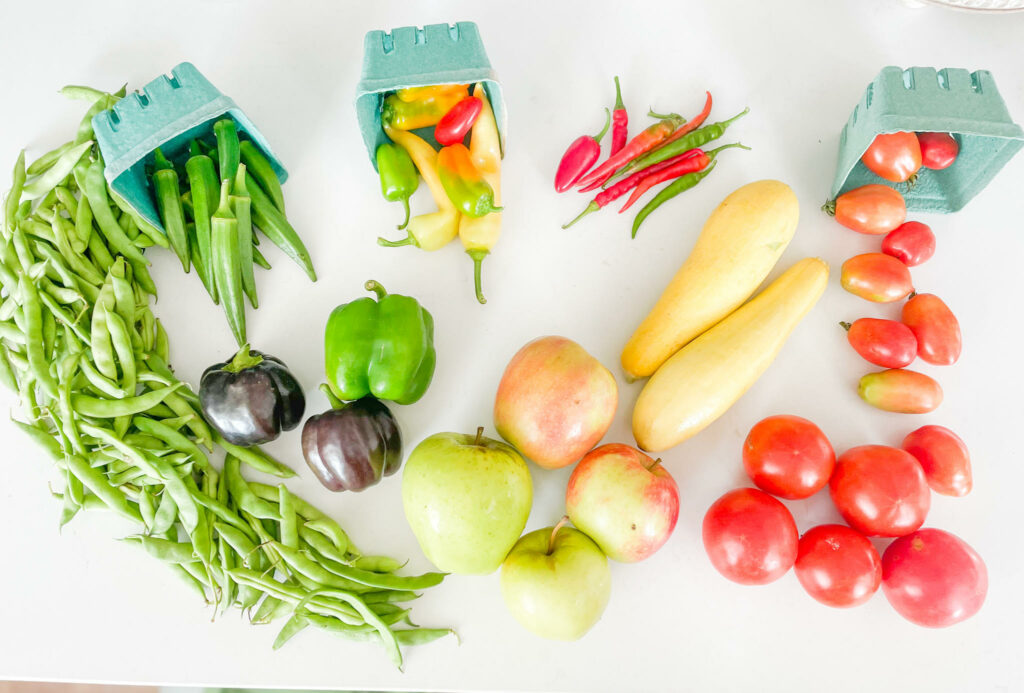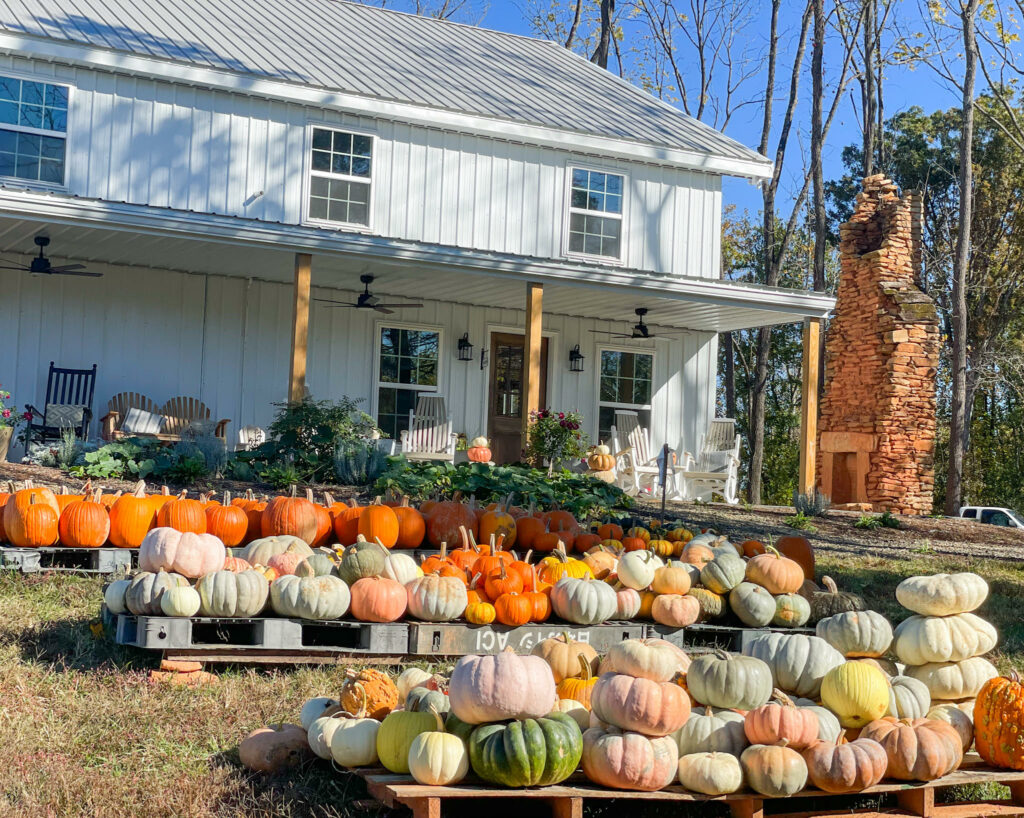Wilkes County Local Farm Spotlight: New Castle Farm
go.ncsu.edu/readext?1027231
en Español / em Português
El inglés es el idioma de control de esta página. En la medida en que haya algún conflicto entre la traducción al inglés y la traducción, el inglés prevalece.
Al hacer clic en el enlace de traducción se activa un servicio de traducción gratuito para convertir la página al español. Al igual que con cualquier traducción por Internet, la conversión no es sensible al contexto y puede que no traduzca el texto en su significado original. NC State Extension no garantiza la exactitud del texto traducido. Por favor, tenga en cuenta que algunas aplicaciones y/o servicios pueden no funcionar como se espera cuando se traducen.
Português
Inglês é o idioma de controle desta página. Na medida que haja algum conflito entre o texto original em Inglês e a tradução, o Inglês prevalece.
Ao clicar no link de tradução, um serviço gratuito de tradução será ativado para converter a página para o Português. Como em qualquer tradução pela internet, a conversão não é sensivel ao contexto e pode não ocorrer a tradução para o significado orginal. O serviço de Extensão da Carolina do Norte (NC State Extension) não garante a exatidão do texto traduzido. Por favor, observe que algumas funções ou serviços podem não funcionar como esperado após a tradução.
English
English is the controlling language of this page. To the extent there is any conflict between the English text and the translation, English controls.
Clicking on the translation link activates a free translation service to convert the page to Spanish. As with any Internet translation, the conversion is not context-sensitive and may not translate the text to its original meaning. NC State Extension does not guarantee the accuracy of the translated text. Please note that some applications and/or services may not function as expected when translated.
Collapse ▲Wilkes County Local Farm Spotlight
New Castle Farm
As featured in the 2024 Fall Edition of the Yadkin Valley Magazine
Interviewee: DeAnna Prevette, New Castle Farm
Written by Elisa Phillips
Nestled down a sunny gravel driveway in Clingman, North Carolina lies New Castle Farm, a 70-acre “you-pick” strawberry and pumpkin farm that also offers seasonal farm share boxes, a produce honor stand, and occasional farm-to-table events. New Castle Farm, which started operations in 2019, is owned and operated by DeAnna and Dillon Prevette.

Elisa Phillips and DeAnna Prevette sit on the front porch at New Castle Farm
In an effort to stay home with her two young children, DeAnna was considering a new line of work outside her former role as a teacher. While visiting a strawberry farm in April of 2019, she thought to herself, “Oh, I could do this.” That fall, she and Dillon were standing in a strawberry field again, but this time they were planting strawberry plants in a field of their own.
The following spring, DeAnna and Dillon harvested their first strawberries.
If you’re keen on timelines, the spring of 2020 may be memorable for you as well. New Castle Farm’s first strawberry harvest and market season took place during the nascent stages of the COVID-19 pandemic.
“Our row covers that we used [are] made out of the same materials as N-95 masks,” DeAnna shared. “And of course everyone was making those, so our first [row covers] were very expensive.”

Dillon Prevette operating a tractor at New Castle Farm. Photo courtesy of DeAnna Prevette.
When asked about her proudest moments as a farmer, DeAnna said, “I think really our first season, the fact that anything grew. I was so amazed – we actually grew strawberries.” After overcoming challenges such as deer eating their strawberry plants “down to the nub,” the couple picked their first small basket of strawberries. But they still questioned whether anyone would want to buy them. DeAnna said, “We thought, ‘what if nobody wants these?’”
“We stuck them out there on our little honor stand, and the next day they were gone,” she said. For DeAnna, that was an impactful moment: “I thought, ‘wow, we can really do this.’”
It also makes DeAnna and Dillon proud to watch their children grow up on a farm, where they can learn about the origin of their food and develop a strong work ethic. She noted how excited her preschool-age son was to plant pumpkin seeds over the summer, approaching the task with newfound excitement each day even though “we just did that yesterday,” she laughed.
More broadly, DeAnna appreciates the opportunity to teach the general public about where their food comes from, commenting that adults are often excited to learn too. “I’ve had adults come here and say, ‘I didn’t know that strawberries came from the flowers,’” she said. “Those are moments I’m really proud I’m teaching someone something.”

Photo of the Prevette family. Photo courtesy of DeAnna Prevette.
Educating the public about agriculture is important since there are many misconceptions surrounding farming. DeAnna shared, “We have some friends from the city, and we’ll talk to them about things… and they’ll say, ‘I had no idea. I just assumed farming should be x, y or z’ because they hear all these fun buzzwords that you’ll hear online… If you’re growing a little garden bed of strawberries, you’re going to treat that differently than acres and acres and acres.”
To combat these misconceptions, DeAnna noted how important it is for people to have opportunities for on-farm experiences. “I just think the more we can get people out on farms, the more the farming community has a chance of survival.”
She is also teaching the community that women can farm too. “I have highschool groups that come out here and… they think it’s weird that I’m a woman,” she says with a smile. “I’m like, ‘hello, I’m the farmer.’ They think a man’s going to show up usually for the talk.”
Her advice to these young people, whatever their aspirations may be, is to “find someone who is doing it better than you and older than you, and just ask them all the questions. The worst they do is say no, and you start back at square one. The best they do is sit down and teach you.”
DeAnna remembers the first strawberry farmer who took the time to explain things to her. “Finally, I found this one guy, and he talked to me for like, two hours that day. He really guided us, and it was so helpful. If he wouldn’t have done that, I don’t know that we would have had strawberry tips our first year.”

Photo of produce from New Castle Farm. Photo courtesy of DeAnna Prevette.
In addition to the farming mentors in her life, DeAnna shared that their local North Carolina Cooperative Extension center has been “amazingly helpful” in navigating the challenges a new farm faces. She noted that since New Castle Farm was one of the first farms to grow strawberries in Wilkes County, the extension agents supporting the farm had to learn alongside her.
“They’ve invested their time to learn, so they can come back and help me even more each year,” she said. “We’re always learning.”
DeAnna mentioned that she has also found local support through the Wilkes County Farm Bureau’s Young Farmers and Ranchers group and the Wilkes County Farm Bureau Women’s Committee.
When reflecting on the challenges particular to their geographic location, DeAnna shared, “It gets cold. We have a lot of microclimates. We watch the weather channel and it says it’s going to pour the rain and we don’t get rain here.”
New Castle Farm is also unique in that it is one of the few farms in the northwest region of the state that grows strawberries, so the farm is heavily reliant on row covers to prevent frost damage in the colder months. “We want [our strawberry plants] to grow as fast as possible and to get as big as possible before frost hits,” DeAnna said. “Sometimes that’s in November, sometimes in October,” she shrugged. “You never know.”
When asked about a typical day on the farm, DeAnna smiled and laughed: “The word ‘typical’ doesn’t exist around here.” However, the farm does experience seasonal rhythms.
During strawberry season, an average day includes an early morning readying the children and dropping them off at school before DeAnna returns to the farm and Dillon leaves for his off-farm job as a Physical Therapist. Once back on the farm, DeAnna’s tasks might include checking on employees and coordinating schedules, taking photos and updating the farm’s social media, preparing invoices for farm share boxes, picking strawberries, or planting in the vegetable garden, to name a few. Afternoon tasks typically include preparing the farm store and selling produce until 5:30 or so in the evening. After dinner with family, DeAnna and Dillon are back out on the farm for evening chores.
“We work until sun down, whatever that looks like,” DeAnna said.
DeAnna acknowledged that there is a growing niche of people who are interested in knowing more about where their food comes from. She is hopeful that New Castle Farm will continue to provide fresh produce to the community, as well as an opportunity for people to learn about their food’s origin and the farming process.
“The future of small farming in Wilkes County is based on community. If we continue to get community support … and people wanting to shop straight from the farm, I can see it still going and growing.”

Pumpkin display at New Castle Farm. Photo Courtesy of DeAnna Prevette.
To learn more about New Castle Farm, you can visit their Facebook page, Instagram (@New.Castle.Farm), or website. Be sure to check out their you-pick pumpkins and gourds, farm store, and farm-to-table dinner this fall.




